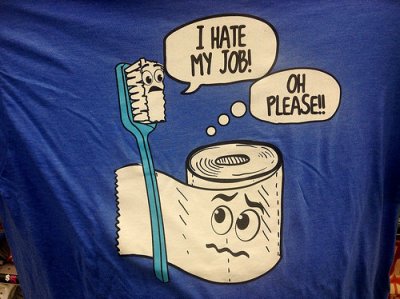Wrong Career Path got you Down? Why it Happened and What to Do Now

By: Tony Hall
by Andrea M. Darcy
A poll by workplace standards enterprise Investors in People found that almost half of us here in the UK don’t like our current job. The main reason given? Being on the wrong career path.
How can you be sure that it really is your career path that is the problem? What are the risks of staying in a wrong career? And what can you do next if it is?
Signs that you are on the wrong career path
Stress is the obvious first sign.You get to work, and you feel the tightness start within. Or the very thought of going to work makes you not want to get out of bed in the morning.
Other signs you are on the wrong career path include:
- feeling bored about the things your colleagues are excited about
- not being interested in taking skills courses or being promoted
- ‘quiet quitting’ – increasingly doing the bare minimum
- not wanting to invest in relationships in the workplace
- feeling like your real skills and talents are never used
- being angry and irritable at work, or numb and depressed
- envying people you know with other careers.
Does the wrong career path matter?
Given that the average worker spends over 3,500 days at the workplace, yes. And workplace stress is no small thing. Even if you manage to internalise it and appear calm to others, stress is very hard on the body. It can mean sleep problems, general aches and pains, raised blood pressure, headaches, muscle tension, digestive issues, or regular flus and colds.
And the wrong career path can lead straight to mental health issues. These can include anxiety, anger problems, depression, substance abuse, and addiction.
Not to mention the toll an unhappy work life can take on our relationships . We can start to alienate friends, snap at our children, and disconnect from our partner, particularly if they have a career they like or pressure us to stay in the job we hate.

By: Mike Mozart
“How did I get here?”
It is important to understand if your dissatisfaction with your career is just a passing phase, or if it’s truly time to change careers.
Start by pinpointing just what led you down this career path. Do any of the following sound close to home?
1. Choosing the wrong career path when too young to know yourself.
Choosing a career when very young can mean you didn’t have enough life experience to make a fully informed decision. You might not have really known who you were or what you valued yet, or have been too influenced by teachers and peers.
2. Parental/family involvement.
It can take time to realise we chose a career because of our parents (and their parents). We are so used to integrating our close knit family’s ways of being, we made our career choice mindlessly.
We have mistaken our family’s personal values for our own for so long we need help seeing the difference.
And in some cases it’s less that parents pressured us to be like them, but more that they pressured us to NOT be them. They pushed their not lived dreams onto you. In your effort to be the person they wish they were, you ended up living out their dream life and career. Deep down you too wanted to be a teacher like them, and here you are a struggling artist!
3.Lack of self-awareness.
Again, we need to know ourselves fairly well to choose the right career (perhaps accounting for why most people experience at least a few career changes in life). If you do not understand your own values, perspectives, and beliefs, you are more likely to choose the wrong career.

Photo by Mikhail Nilov for Pexels
4. Personal growth.
Sometimes the truth is that we have outgrown our career. We’d done so much work on ourselves it no longer matches us, or we have gone through significant life change.
5. Cultural beliefs.
Cultural beliefs can mean you feel influenced to follow a career that is held in high regard within your culture. Of course you may later realise it clashes with what you truly want deep down.
6. Mistaking being good at something as a reason to make a career of it.
Sometimes we have natural talents that mean we get a lot of positive feedback and pushed in a certain direction. But that doesn’t mean that this direction matches up to our values and gives us purpose.
It can be addictive to be good at something, and constantly get positive feedback. But if it’s at the cost of ever feeling good, is it worth it?
Questions to ask if you worry you need a new career
- Did I choose this career path to impress or please someone else? Friends, extended family, my community, my partner, my boarding school alumni?
- Am I simply following in my parents’ footsteps? Or living out a parent’s dream life that isn’t mine?
- Was this career simply the easy option at school?
- Have I had to compromise my personal values and beliefs to do my job?
- Was money the main driver? Instead of thinking about what gave my life value?
- Could this dissatisfaction simply be a phase?
- Is it the job itself, or the environment I’m working in?
- What else is happening in my life that could be the root cause of these issues?
Is it REALLY the job?
An interesting study found that although people wanted to blame everything on workplace stress, it turns out that they had more signs of stress at home than at the office.
In other words, our job can be the easy scapegoat for our very real other issues. It’s easier to blame our job than accept our relationship isn’t working or we aren’t being a good parent, for example. But no job will ever make you happy if the rest of your life is a mess, and changing jobs will just repeat the cycle.
What to do if it really is the wrong career path
First of all, don’t be hard on yourself. It can be overwhelming to face a career change, and we can judge ourselves as a failure. But it’s quite normal to outgrow your job.
According to the Office of National Statistics, each year in the UK almost 10 per cent of workers switch jobs.
It’s important to take time to find clarity. Quitting your job impulsively or based on emotions is never a good idea. Even if it is the wrong job for you, this sabotages any chance of referrals, or even being promoted within the company itself to a job that suits you better.
Then spend time learning about and zoning in on your personal values. Choosing a life based on your personal values is the fast track to a life where you feel more connected, and have a sense of purpose.
Do you need careers counselling?
Seeing ourselves clearly can be hard. So one of the smartest ways to get laser focused on the right career is to reach out for support.
Note that many workplace insurances provide enough coverage for several sessions of work and career counselling.
Harley Therapy puts you in touch with workplace and career counselling in several central London locations. Or try our new platform which connects you with online therapists across the UK.
Have an insight about choosing the wrong career path that you want to share with others readers? Use the comment box below.
 Andrea M. Darcy is a mental health and wellbeing expert and mentor. She chose the wrong career path herself, and left an accidental life as a successful screenwriter to become a health writer and mental health advocate. Find her on Instagram @am_darcy
Andrea M. Darcy is a mental health and wellbeing expert and mentor. She chose the wrong career path herself, and left an accidental life as a successful screenwriter to become a health writer and mental health advocate. Find her on Instagram @am_darcy





